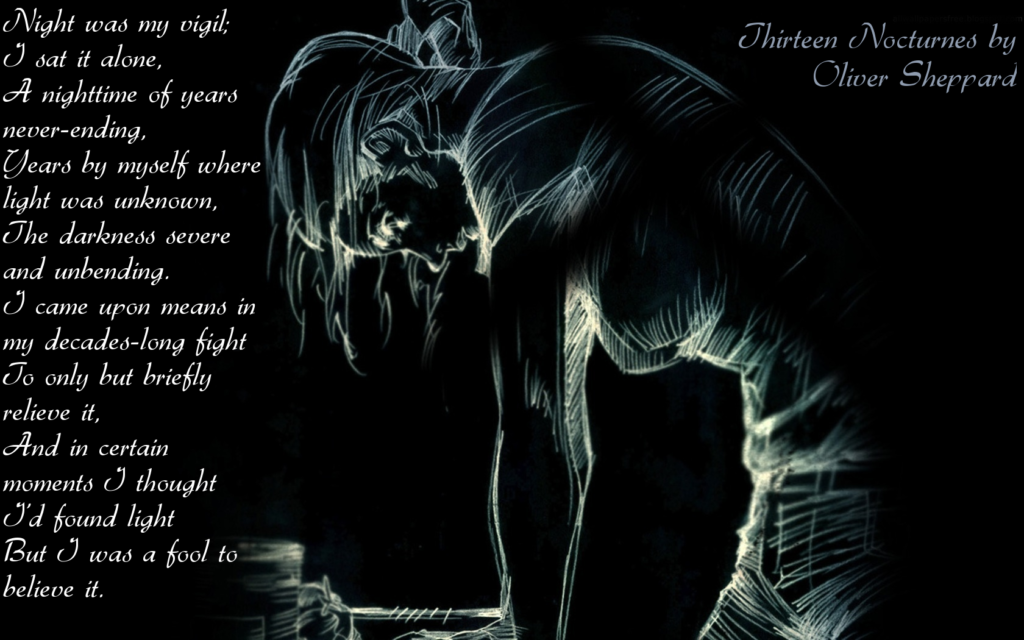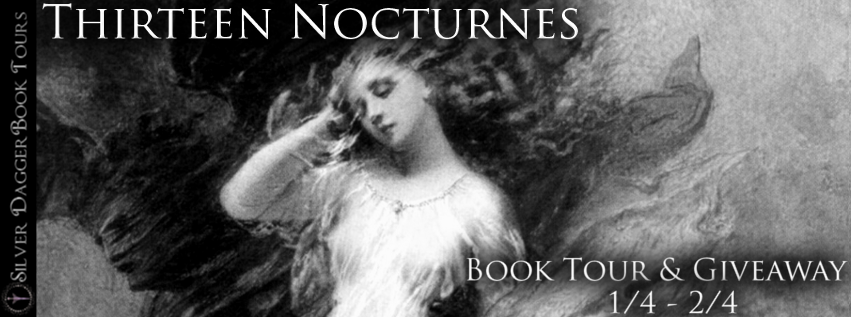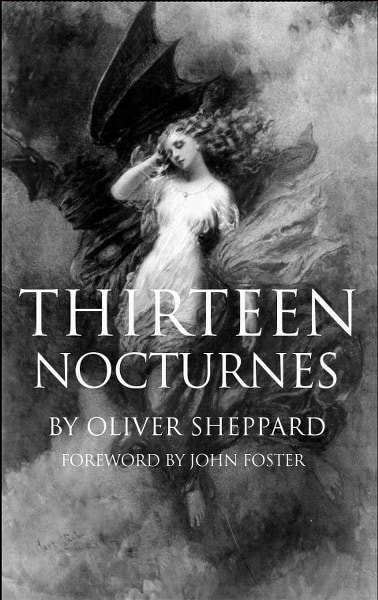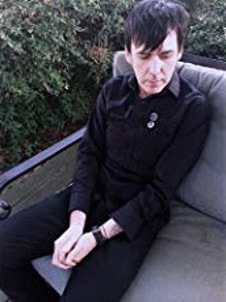
NOCTURNE No. 2
Night was my vigil; I sat it alone,
A nighttime of years never-ending,
Years by myself where light was unknown,
The darkness severe and unbending.
I came upon means in my decades-long fight
To only but briefly relieve it,
And in certain moments I thought I’d found light
But I was a fool to believe it.


BEHIND THE SCENES OF THIRTEEN NOCTURNES
by Oliver Sheppard
Thirteen Nocturnes was completed in the Summer of 2018 after several months of daily writing, weeks and months during which I wrote the book every day as if I were writing a novel. (Thirteen Nocturnes is, of course, not a novel; it is a collection of poetry.) In the Preface to
Thirteen Nocturnes I write that the book is not a random anthology of poetry, but that it is, in fact “a narrative work,” which it is. Of a sort.
The book is comprised of five sections and spread across these five sections are 85 poems. (86 if you count the “Dedication” at the beginning as a poem.) The book’s second section is called “Thirteen Nocturnes” and this is where the original thirteen poems reside. I had originally wanted to write a slender chapbook or even a saddle-stapled ‘zine that would contain thirteen
short poems that were reflections upon, or that were somehow inspired by, the night. This chapbook would be something I could pass out at punk, deathrock, and postpunk shows, perhaps with a mix CD. Perhaps it would be pocket-sized.
As I wrote the individual thirteen nocturnes other ideas came to me quickly, the more so the more I wrote. I began writing other poems all the while going back and editing the original thirteen poetic compositions. I decided to add a second section onto Thirteen Nocturnes, called
“Death and Death’s Mirror,” which contained and does contain some traditional horror poetry (“The House,” “The Vampiress,” and others), some poems on silent film subjects that interest me (Theda Bara and Alla Nazimova, specifically), and other subject matter. A third section began to take shape, and I called it “The Void Cantos.” This section dwells on themes of cosmic fatalism, warfare, material dissolution, nothingness, and it was also originally intended as its own volume. Another section, perhaps the most conventionally narrative of the bunch, I called
“The Dark Corridor to Heaven,” and placed it at the end. And finally there is the Prologue, the section at the very beginning that contains two poems that I did not feel fit anywhere else. I eliminated about 20 poems from the finished book. I have to confess that a mental template was Charles Baudelaire’s Flowers of Evil. Baudelaire–along with Edgar Allan Poe, William Blake, Giacomo Leopardi, Gottfried Benn, and others–is an
ineluctable influence. In his one and only book-length collection of poems, Baudelaire titled one section “Flowers of Evil,” while other sections he gave titles like “Spleen and Ideal,” “Wine,” “Death,” and so on. The collection as a whole, however, he titled Flowers of Evil, which is also
the title of one of the sections within. I decided to follow this structural pattern with Thirteen Nocturnes. I hope I have not done the master a disservice, but have in fact performed a kind of
flattery!
“There is much that is marvelous that is wicked.” This is a line I wrote in the Dedication near the front of the book, and it underscores an idea that runs throughout Thirteen Nocturnes: Namely,
that evil, melancholy, loss, grief, collapse, decay, and ruin can produce their own forms of beauty, beautiful things worthy of their own poetic expression. This is not a radical or even a new idea at this point in history–at least, not all by itself. But this is only one thematic strand that
runs through the book. Besides influences from literature, influences from my own life have informed the writing in Thirteen Nocturnes–for example, my own struggles with chronic depression, or scenes or facts from my own past, as in “Winter Lament,” where I mention
growing up poor. Additionally, although I wanted the literary style at times to serve as a “callback” to 19th century Romanticist and Gothic literature, I also wanted to put into play some
of the stylistic quirks of postmodern literature. For example, some of the footnoting I engage in, especially in “An Infinite Radius,” was chiefly inspired by the Spanish postmodern novel Larva
by Julian Rios. And “In the Shadow of Her Long Hair Flowing” was inspired by the early 20th century poetry of Surrealism and my own youthful encounter with the poetry of Andre Breton.
NOCTURNE No. 13
by Oliver Sheppard
And so of larger – Darknesses –
Those Evenings of the Brain
—DICKINSON
Darkness comes—the day does depart—
But darker still, the human heart.
Dark are night’s spaces,
Which we’ve peopled aptly:
Vampires, werewolves, witches, and ghouls.
In lightless places
The credulous raptly
Listen to fairy tales, trembling as fools.
So darkness deludes us; we’ve all played a part.
But darkest of all is the human heart.
Shadows of nation-state, shadows of blood—
Projections of fancy and causes of war.
Blaming the devil and his evil brood
Exonerates him who’s the war-machine’s whore.
Darkness finds power when daytime departs,
But darker environs are in human hearts.
Evil may be afoot on the earth—
And who is not guilty? Who stands apart?
Satan is blamed, for what it is worth;
Yet darkest of devils is the human heart.
Dark and cruel, the devil’s art—
Darker still, the human heart.









I love how the cover is so serene and almost dark- like. It sounds like a great exciting read!
I’m loving the cover. Sounds like a great collection – I need to check it out.
Reading this sucked me right in; , Thirteen Nocturnes, presents a nightmare vision of a world in the grip of apocalypse and shadow–a world where “a nighttime of years never-ending” becomes “a darkness severe and unbending,” and where life is relentlessly “gathered up against the towering shadow of decay.”
Loving the cover and sounds like a good book